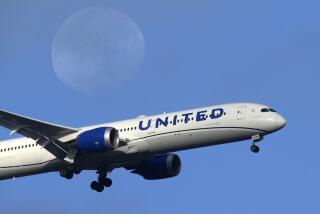Hughes Plans Satellite-Based Data System
- Share via
Hughes Electronics made a $1.4-billion commitment Wednesday to build a satellite-based data services network for U.S. businesses and consumers, a move that is expected to prompt other satellite firms to get serious about their own plans for addressing the growing market.
Hughes’ Spaceway system will provide a high-speed conduit for data, voice, audio, video and multimedia communications, which customers will be able to access with antennas as small as 26 inches in diameter. When the service is launched in 2002, it is expected to significantly improve upon current satellite systems and provide an alternative to data networks operated by phone and cable companies.
The $1.4 billion will cover the cost of three Hughes-built satellites--two to provide the service and one for backup--plus additional ground and space equipment to run the network. The sum will also cover some initial marketing costs, said Pradman Kaul, president and chief operating officer of Hughes Network Systems, the division in charge of the Spaceway service.
El Segundo-based Hughes has been planning Spaceway since 1995, and some of its competitors have long had plans on their drawing boards as well. But unlike Hughes, which is a unit of General Motors Corp., some of those rivals have scaled back their plans because the money to fund them has been difficult to raise.
For example, Loral Space & Communications Ltd. decided to hold off on building new satellites for CyberStar, a service that delivers data and Internet connections via satellite. And analysts said there are persistent rumors that Teledesic--the “Internet in the sky” venture backed by Craig McCaw, Microsoft’s Bill Gates, Motorola Inc. and Boeing Co.--will reduce the number of satellites in its constellation from 288 to about 150 before its 2003 launch.
The well-publicized problems of satellite phone systems over the last year has made investors skittish about high-risk space-based communications in general, said Paul Nisbet, president of JSA Research, an aerospace research firm in Newport, R.I. Iridium World Communications, the global phone service backed by Motorola and a consortium of other companies, was fixing technical glitches right up until the service was launched in November, and subscriber growth has been slower than analysts expected. Meanwhile, Globalstar Telecommunications, which is 42% owned by Loral, lost a dozen satellites last year when the rocket that was supposed to ferry them into space exploded.
But now Hughes’ firm commitment to a price tag and launch date for Spaceway will force rivals to reevaluate their plans, analysts said.
“Hughes is moving forward, and the others have to decide whether they’re playing the game or going home,” said Armand Musey, a satellite communications analyst with C.E. Unterberg, Towbin in New York.
The longer the wait, the bigger the advantage to Hughes, which already has something of a head start. The company currently serves thousands of businesses and consumers via private satellite networks and its DirecPC service.
Spaceway will offer more bandwidth to accommodate faster transmission of more data. Michael T. Smith, Hughes’ chairman and chief executive, said the market for so-called broad-band data services in the U.S. is expected to reach $50 billion by 2005.
Hughes is already building the three HS-702 satellites--which will remain in fixed locations 22,000 miles above North America--at its Hughes Space and Communications facilities in El Segundo.
Hughes shares gained 31 cents to close at $49.38 on the New York Stock Exchange.
More to Read
Inside the business of entertainment
The Wide Shot brings you news, analysis and insights on everything from streaming wars to production — and what it all means for the future.
You may occasionally receive promotional content from the Los Angeles Times.











